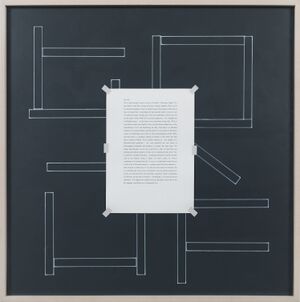Letters to the Red Crayola XIII, 1968-2012
| Letters to the Red Crayola XIII, 1968-2012 | |
|---|---|
 | |
| Art & Language | |
| Project | |
| Year | 2012 |
| Dimensions | 71.2 × 71.4 cm[1] |
| Materials | Ink, acrylic, collage and mixed media on paper |
Text
Dear M, We've been trying to write a review of Lyotard's 'Discourse, Figure'. It's been hard. In part that is because the text is barely readable. This is not to say that the translation is bad, or simply because the content of the book is mad. It is mad, but it's something else that sinks the spirits. In fact, it's not one thing but many. Perhaps one of the most important of these may not be the author's fault. While the Lacanian metaphysics — the 'metaphysics of libidinal energy' — of the book is lost somewhere in the early 1970s, it nevertheless raises ones hackles in the way that Strauss-Kahn does, or the maunderings of Levi and Houllebecq do today. Then there's its admitted influence on Cultural Studies, and then there's its invocation of Paul Klee and an overwhelming sense of the art school psychologisms of the 1960s, and then there's a strangely antique invocation of the rebus and then there's Jackson Pollock. We're neither inclined to — nor capable of a Bricmont-Sokal put-down — we, who practiced our own forms of philosophical ineptitude and madness at roughly the same time. The shame and pleasure of our own youth tells us that we had better say nothing good about ourselves. In the end we pinched an idea from Tom: Lyotard's is a Charlus discourse — a juddering absurdity in perfect French, and we are Marcel, trying to figure out what's going on. There's something to be learned from this: if you try to understand French Theory as the work of fictional characters — perhaps indeed Proustian characters — then it begins to make sense. It's not that one must read it as literature, but as something said in the voices of characters who are already encased in a fiction: not literature itself, but something 'contained' within it. (Speaking of literature, the last line of Verlaine's 'Art poétique' is 'Et tout le reste est littérature'. We might echo it faintly and say that there is the work of Art & Language, and all the rest is Conceptual Art.)